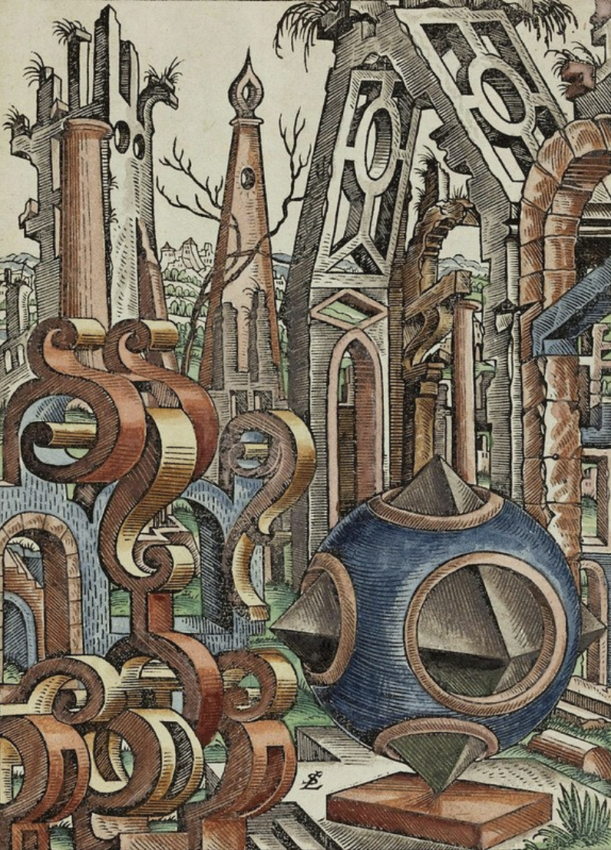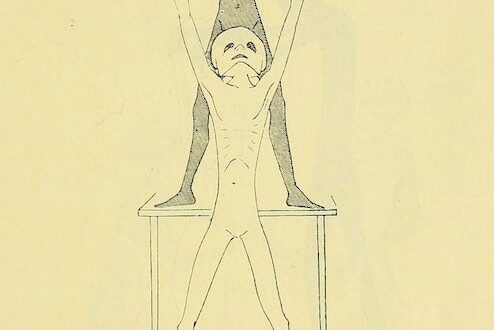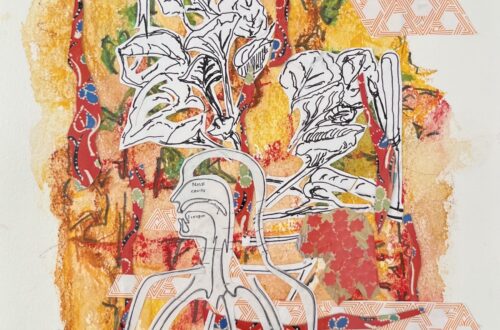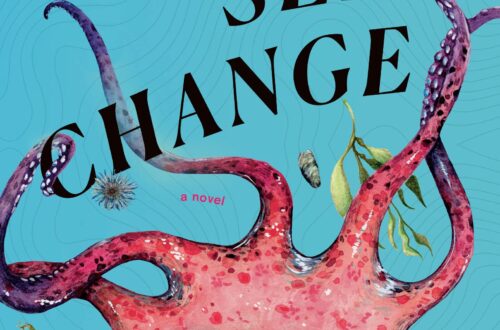
Traveling With a Door
image Lorenz Stoer (1567), from The Public Domain Review
by Sandra Hunter
The girl watches the woman—green beret, yellow balloon pants, blue shoe, white shoe, ripped red scarf around one wrist—an eight-foot slab of wood across her back, bending her into prayer. The woman prays and curses across the road in front of cars stunned into stillness. When she reaches the curb, she unloads against a telephone pole the slab, nestling wood to wood. She breathes heavily, head down, drags her scarfed wrist across her face and neck, looks up to the sky, stretches her arms wide, heaves the wood onto her back, and continues, pray-cursing along Martin Luther King Junior Boulevard.
The girl waits until she can hear the heavy breathing, the heavy footfall, waits until she can see the sweat running down the sides of the face, —What you have?
The woman plods past and the girl swivels to catch up with the slab. —But what you have?
—What’s it to you?
—I am curious person. My father says don’t curious because no man will to marry to me. Is this table?
—You talk weird.
—And you are to carry large wood. Weird also, no?
The woman stumps along, the wood creaking into her rhythm. The girl walks lightly, toes first, pink ballerina slippers. She flips back long red hair. —Not table?
—Door.
—Ah, yes. Table got leg, right? Good door. First?
—What?
—First door in your life?
The woman slows, tips the door off one shoulder, props it against a street lamp. She looks at the girl with her one good aqua-colored eye.
The eye opens and the girl feels the familiar sickening, hurling sensation as she’s sucked into a thrusting of arrowed iris, pitching and rolling towards the pupil’s dark horizon. She claws at the stiff iris arrows and they melt, become wider than the furrows in a plowed field, wider than the river of the town she came from.
She is walking across the bridge heaving and rolling with bodies that drop over the side to heave and roll in the river, the children shouting and the fathers growling and the mothers calling, it’s time now. Come for your dinner. Come for your breakfast. Come for your coats and sticky buns. And the people call up to her, come down, come down for your dinner it’s time now. The girl runs across the bridge, a sudden longing for the fried eggs and crispy potatoes her grandmother made on Sundays. She sniffs but the air, like the bridge, is empty. And the bridge folds its legs as the girl steps onto the gray street with buildings that are now ragged black holes.
The woman blinks and the girl is back on the sidewalk in a city she doesn’t know, trying to not to look like she’s going to throw up in front of the woman staring at her.
—Them shoes won’t keep a mouse warm. You need warm shoes.
The girl breathes in, refuses the nausea, tries a smile, —I have not cold. I have feet being hot.
—Lucky you. Well. Bye.
The woman levers the door upright. The girl lifts a hand, —Let me to help your door. You are the old. I am the strong.
The woman opens her mouth and the girl twitches the door onto her back and walks as though she is carrying a pillow. The woman hurries to catch up, —Give me my door.
—We go this way all together. You are tired.
—I’m not paying you.
—What?
—I said I’m not giving you money.
The girl stops, slips the door off her back and holds it upright, —You have money?
—No.
—Who have money? Let us to get money.
The girl’s gray eyes are sparkling. Money will get her home. The woman puts a hand on the door, —Look. You helped me. Thanks, and all that shit.
She struggles the door onto her back. The girl follows, toeing forward in her pink ballet slippers. —But you like get money also?
—Listen. I don’t got money.
The woman jerks at the door, re-settling it, but the door slips forward over one shoulder and she staggers sideways, unable to control the tip and slide into the traffic. A riot of horns, a jubilation of rolled-down windows and volleyed obscenities. The girl snatches at the woman’s balloon pants, a snorting rip, reaches, grasps the door edge, wrenches both door and woman back onto the sidewalk, and a bike lurches up and ejects the rider on top of the door, pinning the woman underneath.
The girl, screams, wrenches the rider away, —You kill her! You bloody fucking!
He groans, —I think I’m hurt.
The girl is prying the door off. —Who care fuck about you? Fuck off!
The rider checks the bike, the front wheel is bent. He stands carefully, —Look at my bike. Well. Not my fault. I could have been badly injured. What was she doing, running out into the road?
The girl flashes slate eyes, —What you? Some idiot can’t drive bike. Bike is for road. Not hitting old ladies.
Faintly, from the crumple of balloon pants and mismatched shoes, —I’m not old.
The cyclist shakes his head, limps his bike away.
The girl, fists to hips, —Lady! Come on! You okay.
—I can’t.
—You get up. You fighter bitch.
The woman manages to sit, holds her head. The girl points to the cyclist lurching away. —His bike jump on you. Why? We cannot say. Where your house?
The woman is looking at her torn pants, —Look at the state of these.
—You want? I got leggings under.
The girl starts to haul her green tracksuit bottoms off but the woman stops her. —No. I’m okay. I’m—oh shit. Is it broken? Did I break it?
She’s peering at the middle of the door, a small square of glass, set off-center. The girl squats to look. The width of a hand, the glass is divided into curved sections, pink and light blue. A rose.
—Not break. Very beautiful.
And sees it: the door set into its place, the afternoon sun lighting the rose and reflecting on the dirt floor.
The woman pats the door, —That’s something. But I think my leg’s broke.
The girl shakes her head, —You not broke leg. My cousin broke leg and he scream Jesus to heaven. Now I check.
She places her palm gently on the woman’s ankle, —Okay here? And here?
She works her way up to the knee and the woman winces. —I gotta get home.
The girl frowns and gently palpates the knee, —Lig-a-ment. Here? Yes?
She releases the scarf rag from the woman’s wrist and ties it around the knee. —Maybe you walk.
The woman struggles to stand and winces as she takes a first step, and stops. Stares at the girl, —This is your fault. I coulda been home by now.
—You jump in traffic all yourself. Congratulation.
The woman rubs her knee. —Aw jeez.
—Ice and rest.
The woman sighs, —You see any ice around here?
She tries to bend down to pick up the door, moans in pain. The girl, a ballet slipper toed under one corner, lifts the door to knee height, grasps and flips it onto her back. —We go.
The woman jerks into a half-hop, half-walk. —Wait. I can’t go that fast.
A flatbed truck goes by, the workers hang out the back, Hey, spitfire, hey red, I can help with that, I’ll take care of you. One of them drops his cigarette in a shimmer of cinder-light, and the truck accelerates, the workers laughing hard against being jerked back and forth.
—So, you a weight lifter or something?
—Way-lift?
—You know. The gym, lifting whatever, a hundred pounds. You don’t look strong. Just a little thing, but—ow. My knee.
She stops, panting. —Give me a second here.
The girl slows, repositions the door. —Your house?
—Down there.
They move again more slowly, and take the next turn off the main road. The street is narrow, tree-lined, the smell of leaves, planters on the sidewalk. The girl checks each one for beans, berries. In one, a budding tomato’s tiny green and white striped eye beckons, but she resists the lure that can easily ink-blot time, drag her back to the accusing voices. Why did you leave us?
The woman rocks along like a small sea-boat, —So where-all you from?
How to describe home when it isn’t home anymore? If you say, I am from here, there is an assumption of farm and horses and chickens and someone standing in the doorway waving a towel, come for breakfast, someone’s graying beard that twitches forward when he eats his bread, someone’s large boots that you threw out of the window because he took your Bruno Mars tape, someone’s small face that you kiss goodnight after story-time. And if that assumption is blasted apart by a curse falling from the sky, then you are from nowhere.
—From here now.
They turn down a smaller street with no houses. The path runs through grass and mud and blue and black tarps and one woman is outside the tent sweeping the grass and here is a kettle with a flower growing out of it and there is a chair with a red plate and here is a boat covered with white canvas and someone is bent over, coughing, vape pen clutched in one hand.
The woman says, —Here.
She walks up to a large white tent with uneven light and dark slats of wood wedged together to form a front wall. Across the doorway is a thick plastic curtain. The girl releases the door from her back and watches the two small children, who slip out from behind the curtain, silent, curious. The woman’s face opens, her scowl gone, —I tolja I’d bring it, didn’t I?
The small girl frowns as the woman limps to take the door, —Mommy? You okay?
—It’s nothing. Look–whadja think?
The children, staring at the stranger, switch their focus to the door, touching it shyly, as though it’s an animal that might turn on them. The boy, —Is it ours?
The woman’s smile pushes her cheeks up and she looks young, —There’s a magic window.
The children strain to look at the inset. The small girl is too short to see, so her brother lifts her up. —It’s a flower! It’s a flower, mom.
The woman, —We can put lights around it for Christmas.
You’d think it was Christmas now the way these kids are laughing and jumping. For a door.
The girl turns away. Something hurts in her chest and she needs to find a place to sit so that she can cradle the pain and soothe it. The woman calls to her, —Wait. I have a—wait.
She sends the boy to fetch something from the house-tent. He comes back with a tiny pink plastic backpack. The woman unzips the front pocket and pulls out a crumpled bill. Five dollars. —I’m sorry it’s not more.
The boy squints up at the girl, —Come on. I’ll show you the river. He tugs in his pocket, —And I got marbles. Like, six.
But the girl doesn’t want to see the river, doesn’t want to feel the magnetic drag of the marbles’ swirling eyes, doesn’t want the five dollars. But wishes it were twenty. A hundred. Wishes it were a bridge, a ship, a magic carpet that would take her back to the farm, to the goats running to meet her, to the sulky yellow hen that must be hand-fed, to the faces that have smiles and jokes and the gentle hands that help the smallest of them up onto the fence railing to meet the horses with the white tails, to the fierce hands that clap proudly for the girl at her first dance recital, to the voice that calls the last goodnight, to the place that was green and smelled of earth and the river and bread before the sky burst.

Sandra Hunter’s stories have won the 2018 Lorian Hemingway Short Story Competition, 2017 Leapfrog Press Fiction Award, 2016 Gold Line Press Chapbook Prize, and three Pushcart nominations. She is a 2018 Hawthornden Fellow and the 2017 Charlotte Sheedy Fellow at the MacDowell Colony. Books: story collection TRIP WIRES, chapbook SMALL CHANGE, LOSING TOUCH, a novel. She is a fiction editor with Nimrod International Journal and is a writing coach.




